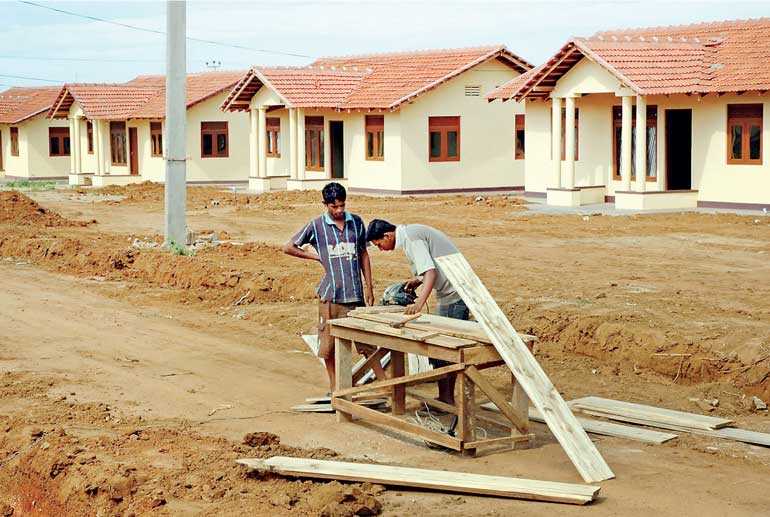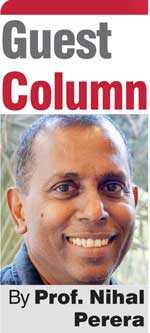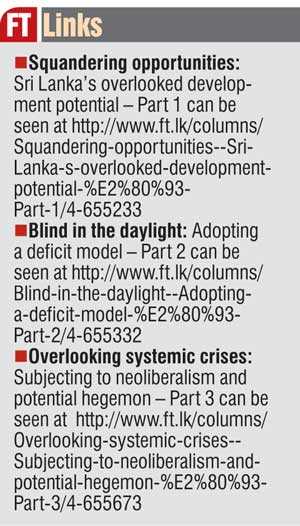Monday Feb 16, 2026
Monday Feb 16, 2026
Wednesday, 30 May 2018 00:00 - - {{hitsCtrl.values.hits}}
Both supporters and opponents of the dominant development paradigm share a similar position: They perceive development as national economic growth that follows the West’s historical trajectory, propelled by an industrial revolution. Most countries in the world are industrialised although not considered “developed” and almost no national leader, expert, or critic believes in this paradigm they “practice.” This impasse calls for a different mode of thinking than the one that caused it.
Let’s direct our attention to the intended beneficiaries of development: the ordinary people. “People” broadly refers to the individuals who make up civil society. As they construct life journeys and goals within their immediate contexts of opportunities and constraints, their goals and paths are diverse. Hence the question: How can the specialists acknowledge, accommodate, and/or support diverse life journeys without homogenising and suppressing this field of difference?
In practice, politicians, policymakers, development experts, and planners have a way of focusing on economic growth, pet projects, and their personal interests. According to the scholar of ethnicity and urban policy Scott Bollens’ observations in Jerusalem, they dismiss everyday issues as “low-politics”, privileging the “high-politics” of the elite and authorities. In Sri Lanka, the critics of the national budget focused more on “upper-class items” such as car permits. The growth discourse is so hegemonic that most Sri Lankan men have strong opinions about highway construction and American bombings but do not realise the bus did not stop for them to get off.

The project that cost the least empowered the community the most. The provision of houses in Aceh and Hambantota victimised people at first, and although they bounced back, the adjustment took great effort.
In contrast to the homogenisation of communities caused by the tools used by policymakers and planners, differences are produced from within communities. To be human is to be different. Values in Asia include, among others, giving, giving up, tolerance, kindness, non-violence, incrementality, sramadana, machizukuri (method of inter-community/community-government dialogue), and jugaad (finding a low-cost solution to any problem in an intelligent way). Prosperity too has a broader meaning beyond money and wealth. Happiness definitely does. The hegemonic growth-discourse is unable to appreciate people’s life journeys and the values that drive them.

Development is not a thing that the state can give to people; it needs to be produced by people. Development is not a destiny prescribed by numbers but, according to Amartya Sen, a process that enhances the capability of people to live the life they value as long as naturally possible. Critically building on this and recent conceptualisations, I view development as improving and harnessing local strengths, potential, and capabilities, largely at individual and small institutional levels, in ways that help ordinary people enrich their quality of life and achieve aspirations. As development specialists Nabeel Hamdi, Susil Sirivardana, and John Turner suggest, the state can facilitate people’s life journeys. It can provide a supportive environment by removing obstacles.
I wish to use three post-tsunami recovery projects to highlight the difference between provision and support and their effects. I refer to Banda Aceh (Indonesia) where 200,000 people died, Hambantota where over 10,000 people died, and Phang-Nga (Thailand) where the damage was not severe. Most money was spent in Aceh: By January 2008, a massive highway was built and some victims had nice-looking houses, but most of these hardly had sewerage connections. The five main housing projects in Hambantota District were better managed: The victims live in architect-designed houses with water and electricity built on Government-donated land, a “middle-class dream” come true. The ordinary people who received these worked very hard to adapt to the unfamiliar environment: Some rebuilt toilets; others built temporary outdoor kitchens. The King’s Project in Phang-Nga was much simpler: The survivors were given a single room raised on four columns, with a toilet and a large roof. It provided the springboard for building houses, more efficiently and effectively, both individualising them and catering to their needs. Within a year, people built a diverse neighbourhood.
The project that cost the least empowered the community the most. The provision of houses in Aceh and Hambantota victimised people at first, and although they bounced back, the adjustment took great effort. The King’s Project treated people as survivors and trusted in their ability to rebuild their own lives and environments and facilitated by providing shelter and support. These were precisely what they received. A small investment supported a huge change.
In view of supporting people’s effort to build their own lives, I wish to highlight ten issues that the state and the experts can attempt to address:
Poverty: Money and wealth cannot guarantee contentment and happiness, but poverty is a crucial roadblock to accessing basic needs, resources, social justice, and rights.
Mobility: People deserve the freedom to go wherever they want safely in a timely manner, without harassment.
Health and education are missing, but no one questions their absence.

Discrimination/harassment: Ordinary people should be free to achieve their life goals without racial, religious, gender, and other classification-based discrimination and harassment. While minorities are discriminated and women are burdened with continuously having to protect themselves from harassment, abuse, and advances by men in buses, trains, and public places.
Time poverty: When more time is in their hands, people are likely to carry out more acts they value, fine-tuning their life journeys in meaningful ways.
Fear: The end of the war had allowed much freedom to be outside, but women fear harassment, and minorities fear discrimination. These are hardly addressed in contemporary political, development, policy, and planning practices.
Social justice has been central to Sri Lankan politics, substantively until the late 1970s. Yet, people have very little regard for the institutions that are supposed to interpret law, dispense justice, and maintain law and order. Most prefer to dispense justice by themselves.
Sense of duty: People find it tremendously difficult to get work done at government offices — even hospitals — without bribes, favours, and personal connections.
Sense of belonging: People constantly struggle to establish their identities. As political leaders mobilise people by feeding group-isms, political affiliations became like opium. As they internalise fear and insecurity, the subjects fall short of becoming nationals.
Mentality of scarcity: People compete everywhere, even when buying hoppers, as if there is enormous scarcity. Much of the above conditions lead to and emanate from this mentality. It is a gaping hole in the rich culture of Sri Lanka and the primary driver of its underdevelopment.
In summary
This article does not present a comprehensive critique of development or an alternative. It provides a platform for substantive discussions and critiques on how to approach development from a people’s perspective.
The State’s assumption of the role of provider of development is elitist and wasteful and victimises people. Development, as practiced, has strayed — especially with people not being able to fulfil their educational, health, and transportation requirements through regular schools, hospitals, and bus services. Mega-scale infrastructure projects have not bridged this gap. Development should consider people as the most crucial resource and infrastructure and help people achieve their aspirations by removing obstructions, enhancing their capabilities, bridging small gaps in the processes, and providing the appropriate environment.